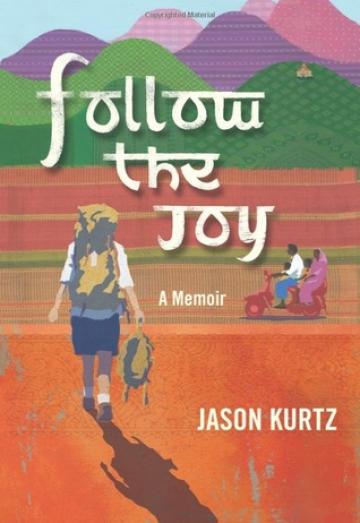FOLLOW THE JOY: JASON KURTZ INTERVIEW
At 27, I bought a one-way ticket to India. I had no idea what I'd do when I landed, but in the past my most rewarding experiences came when I let intuition be my guide. So, I traveled without an itinerary and found myself searching for an elusive monkey temple, teaching Tibetan monks to sing, "You Are My Sunshine," and holding the hand of a dying man at the Mother Theresa...
Jason Kurtz's Follow The Joy (available on Amazon) is the story of how he found his calling, his career, and his family, by buying a one-way ticket to India. Told with confidence and clarity, the book displays the author's acute ability to observe and to empathize, transporting readers to places, be it in the exotic world of India or deep inside the human soul, where positive change happens. KGBBAR.LIT was pleased to interview this up-and-coming writer and find out more about this wonderful new book.
KGB: What caused you to fly to India, without even a return ticket?
Jason Kurtz: I didn't want to have a return ticket. I didn't want to know anything about the country, or about what I might do once I was there. I was 27 years old, and I was pretty unhappy. I had no career, no girlfriend, and no idea what would fulfill me, but at the same time, I refused to accept that work had to be an unpleasant means to an end. Because of this, I had bounced from one career to another, and each time I felt more and more desperate, more and more afraid that I'd never figure out what I wanted to do with my life. Then, I read a book called Miracle of Love, a collection of stories edited by Ram Daas about his Indian guru. When I was finished, the idea of traveling to India simply wouldn't leave my mind. It didn't make any rational sense, and in fact the idea terrified me, but an inner voice felt excited as well. I had traveled internationally before, and what I'd found was that the most rewarding experiences I had came when I stopped trying to predict what I wanted to do, and simply let intuition be my guide. I decided that I'd try to follow the voice that urged me on to India, and I decided not to create an itinerary of any kind, nor to buy a return ticket, in order to give this voice free reign to lead me anywhere, for any length of time necessary. I was determined not to return home until I understood what I wanted to do with my adult life.
KGB: What was it like when you stepped off that plane?
JK: Horrifying. There were so many people, and so much poverty. Everywhere I turned there were people living on the streets, sleeping under cars, begging for food. Even little children, begging for food or milk or candy. I found myself running away from lepers, being manipulated by beggars, and abused by taxi cab drivers. I wanted to travel by train, but I couldn't figure out how to board the right train, and often had trouble even buying tickets, or figuring out which trains went where. I ate at local restaurants, which often had no English menus, so I often didn't know what I was ordering, and the spicy food made me sick. It seemed that everything I had to do was confusing, overwhelming, and had the possibility of making me very sick.
KGB: What experience had the greatest positive impact on you?
JK: I had a lot of amazing experiences, but what really stays with me to this day is the time I spent at the Mother Theresa Homes for the Destitute and Dying in Calcutta. I went there with a very vague idea that I'd learn something about selfless service, but it was really one experience in a sequence where I simply felt an irrational sense of joy at the prospect of going to this place. When I got there, it was horrible. People were dying in front of my eyes. They were starving, emaciated, afraid and in pain. Often all I had to offer was a glass of water, or a clumsy wash down. But, it's amazing to me how human beings acclimate to their circumstances. What was overwhelming at first, became gradually easier to tolerate, until it actually became normal. Then, I was slowly able to see how important these seemingly simple actions were. I discovered that when people are dying, it can help us focus on what really matters. Then, simple acts of caring feel vitally important. To touch and be touched. To love and be loved. To care for and be cared for. There really isn't anything more important in life, and in an environment like this, when people are in need and when you as an individual have to provide for that need, the value of human connection and care stands out. I realized that when I brought someone a glass of water, or even sat with them in silence, I was participating in something quite glorious. In a hospice, the focus is on being with others, rather than on what we do for a living, or what our future prospects are, but simply on who we are at that moment, and what we mean to each other as human beings. In an environment like that, I really had a chance to discover the power of being present, of being so vibrantly alive that there are no thoughts of the future, or concerns about the past, but simply one precious moment after another. It was a transforming experience that still informs my life today.
KGB: How did you know you were on the right track?
JK: I didn't, really. That's part of what made this journey so difficult. In hindsight, I can see how one experience led to the next, but when I was living it, it felt like, yeah, that was amazing, but now what? I taught English at a Tibetan Monastery, volunteered at the Mother Theresa Homes for the Destitute and Dying, made friends, met Hindu gurus, practiced meditation and yoga, but I still didn't know what I wanted to do with my life, and I still didn't know how to find the right woman, or even if I ever would find someone I wanted to marry. It was confusing and frightening. I didn't know I was on the right track. It was a leap of faith. I had to believe that the voice that was leading me to these experiences knew what it was doing. In the end, I got everything I hoped that might be possible. I'm married. I have a career that I love. I have a wonderful son. But I never knew I'd get there until I got there. It was an act of faith. I had to believe and keep believing that if I followed the joy I'd eventually get there.
KGB: What message do you want to leave with our listeners?JK: I hope to encourage other people to follow their own inner voice, take the risk that they want to take, irrational as it may be, and see where it leads. I see this with my clients, at times, when they really begin to understand who they are and what excites them, it often comes out that there is something they want to do, or something that they are currently doing that they wish they didn't have to do, and as they learn to express themselves, and learn that the world is not as ossified as it may have seemed to be, and they begin to change their lives. Maybe they quit their job, or maybe they approach it in a different way, maybe they leave their partner, or maybe they experiment with expressing their needs in different ways, but once you begin to believe in life's possibilities, and once you learn to listen to your own inner voice, then miraculous things can happen, possibilities that were never even dreamed about can emerge, and life can be much more fulfilling than we often believe is possible. I hope that my book inspires people to listen to themselves, in fact, to spend some time just listening to themselves, and then have the faith and the courage to see where their joy leads them.
 Jason Kurtz is the Director of Training at the Training Institute for Mental Health, a New York based psychoanalytic training institute, where he also serves as a teacher and supervisor. He is a psychoanalyst in private practice in New York City, who lectures on the synergy between meditation and psychotherapy. For more information, go to https://followthejoy.net
Jason Kurtz is the Director of Training at the Training Institute for Mental Health, a New York based psychoanalytic training institute, where he also serves as a teacher and supervisor. He is a psychoanalyst in private practice in New York City, who lectures on the synergy between meditation and psychotherapy. For more information, go to https://followthejoy.net
